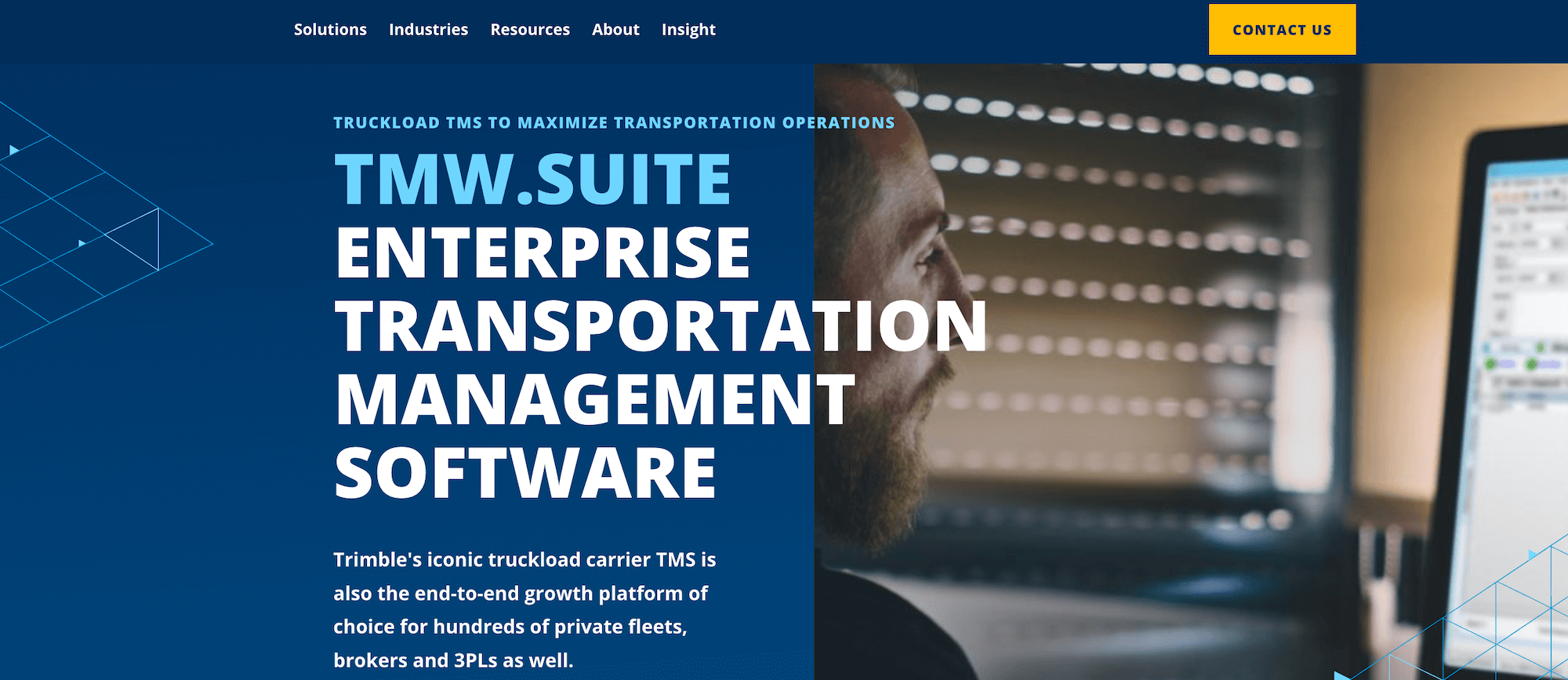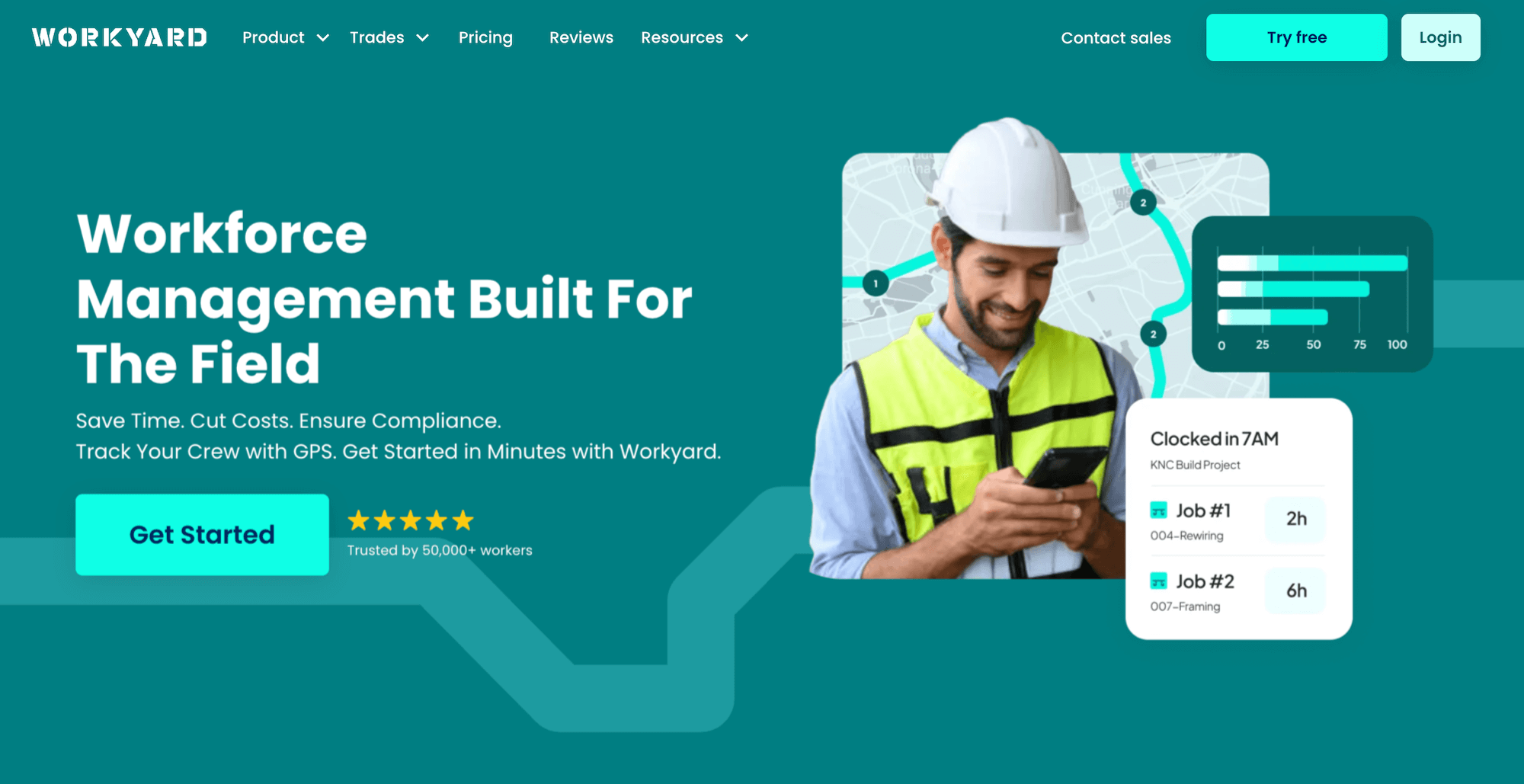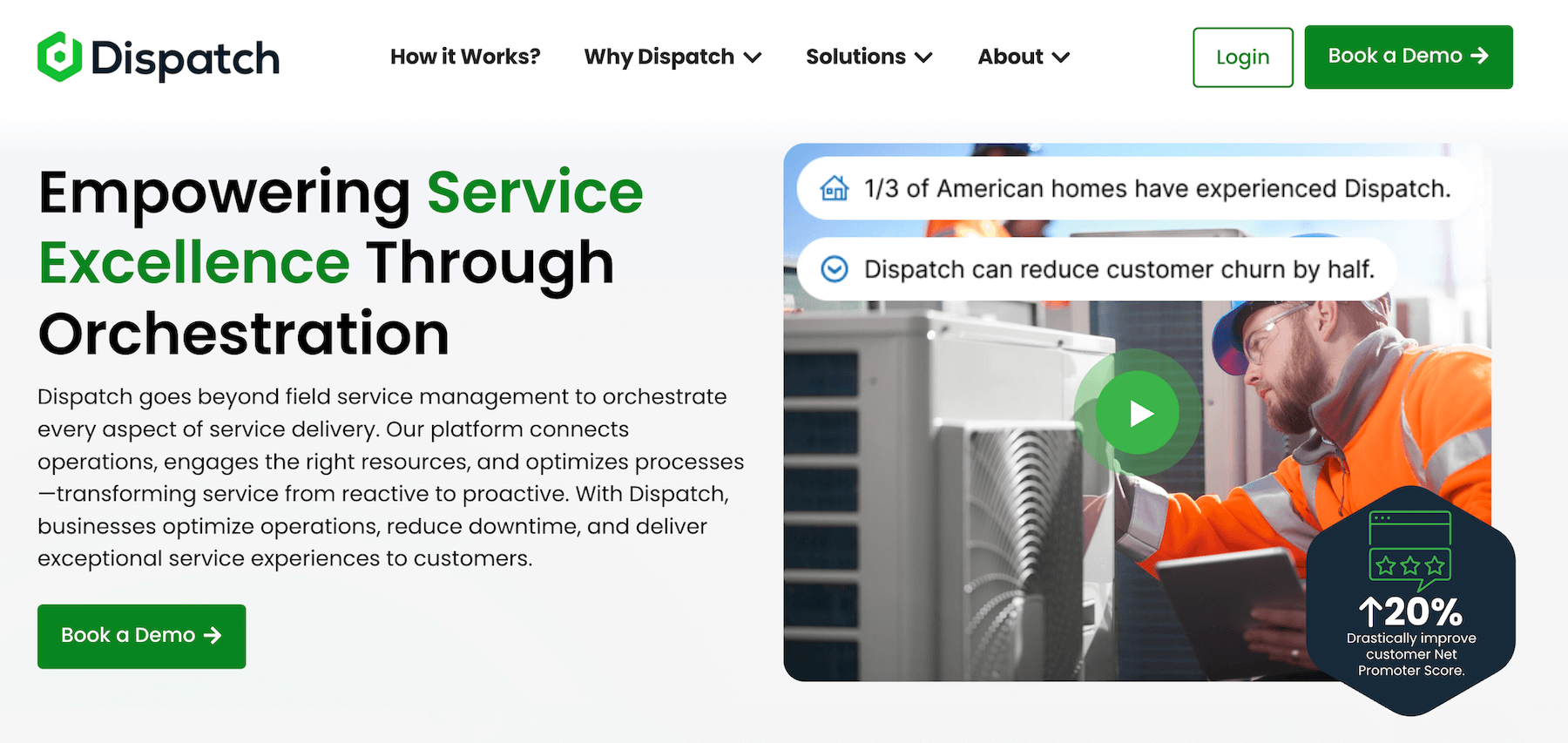Whether you’re a bulk hauler, construction company, delivery service, or general freight trucking operation, consider the following questions when choosing a dispatch management software:
- Is it right for my type of business? Different dispatch tools are typically built with specific business types in mind, as each operation—from carriers to brokers to specialized delivery services—has specific workflows and requirements. For instance, if you’re a bulk hauler, you’ll need software that helps you manage the many loads you handle daily and cuts down on all the related paperwork. Your solution should also track the details that matter in bulk hauling—like scale ticket numbers, commodity weights, and other information for each load.
- Does it reduce the amount of data entry you need to do at dispatch and downstream? Some legacy tools require you to continuously fill in data fields and copy and paste information between dispatch software, accounting platforms, billing systems, and customer portals. But for it to be actually worth the investment, a dispatch tool should save you time on data entry and help you grow your business without adding more staff.
- Will dispatchers and drivers actually use it? Dispatchers should spend a lot of time using this tool. But the trouble is, if they don't genuinely love to use it, you'll end up with a system that nobody adopts or, worse, that your team actively works around. So, look for trucking software that’s easy to use and fits naturally into how your team already works. It should also integrate with tools your drivers are comfortable using, instead of forcing them to learn an entirely new, complicated system.
Choosing the right dispatch management tool is critical because when dispatch works well, your entire operation benefits. The right tool gives various teams across your company the information and support they need to manage and track loads; process invoicing, driver pay, and IFTA declarations; and deliver great customer service more efficiently across the entire operation.
In this guide, we share seven tools for different types of companies. We start with Toro TMS, a dispatch-first trucking management system (TMS) we created for bulk haulers and other trucking companies managing many loads a day.
Ready to see how the right dispatch software can transform your business? Book a demo today and learn how Toro can work for your bulk hauling operation.
1. Toro TMS: Dispatch management software made specifically for bulk haulers

Bulk haulers, in particular, are poorly served by generic dispatch management software. That’s because most conventional dispatch tools for trucking can’t handle the high volumes of loads—and the associated paperwork and data entry—that you’re having to manage each day.
We created Toro TMS to make it as easy as possible for dispatchers to get many loads out on the road every day. However, the tool is also designed to reduce data entry for your back office teams.
That’s because, in our experience, most TMS software for trucking requires your teams to reenter the same data about each load multiple times through dispatch, payroll, billing, IFTA reporting, and more. With Toro TMS, you only need to enter that load data into the system once, and it’s available to everyone else who needs it.
As a result, not only do dispatchers love the software, but your whole company benefits. With Toro, you can cut the time your dispatch team and back office spend on data entry by 70%.
For instance, Peter Trucking LLC, a bulk carrier that hauls grain, feed, and general freight across the country, saw immediate time savings after implementing Toro TMS.
"Dispatching all at once at the end of the day just pulled out 2 hours out of my afternoon work. I used to do each one by one and message each driver individually."
Here's how Toro tackles the specific dispatch challenges that bulk haulers face every day.
Create load templates to dispatch repeat jobs in seconds

Truck dispatchers spend hours entering and re-entering load data, particularly in bulk hauling. This repetitive process wastes a lot of time, especially when handling regular routes and recurring jobs for repeat customers.
With Toro, you can create and save load templates that make dispatching jobs faster and more efficient. Our customizable templates help you:
- Save load details, including customer information, materials, routes, and pricing, so they’re ready to be used again and again.
- Apply templates with a single click so you can instantly duplicate recurring loads.
- Batch-apply templates to multiple trucks at once for large-scale operations.
- Update templates centrally when details change, ensuring all future loads use the correct information.
These templates help to dramatically reduce the time you spend on dispatch tasks, freeing up your team to focus on optimizing routes and responding to customer needs. Plus, the information from these templates automatically populates into all downstream processes—invoicing, billing, and payroll—to save your back office time too.
See everything dispatchers need on one screen

Toro brings together everything dispatchers need into a simple drag-and-drop dashboard. Here, you can easily assign loads to each truck and driver, see your entire fleet's schedule at a glance with color-coded status indicators, and make adjustments on the fly when plans change.
Our comprehensive dashboard lets you:
- Drag and drop the loads you've created onto driver calendars. It gives you real-time visibility on driver availability and allows for instant scheduling, eliminating unnecessary back-and-forth communication.
- View driver schedules, compensation details, HR information, work history, and more in personal driver profiles. All this information is automatically synced with your dispatch dashboard, giving you everything you need on one screen.
- Connect driver pay information directly to each load, automatically tracking hours worked and mileage driven. It spares your back office unnecessary work by removing the need to manually recalculate labor costs when processing driver payments or preparing customer invoices.
- Access complete vehicle service history and maintenance schedules with a single click. By viewing the "Trucks" tab, you can also see which trucks are currently offline or unavailable.
- Review performance data including utilization rates, on-time delivery percentages, and revenue per truck. This way, you get the insights you need to optimize your fleet operations and maximize profitability.
Send load information to drivers by text message—no apps required

Most dispatch systems force drivers to download special apps or access web portals to receive dispatch instructions. But in our experience, drivers typically resist these tools because they’re just not easy to use.
This leaves dispatchers to use workarounds—such as making phone calls or manually typing out text messages—to get delivery information out to drivers. These extra steps add more work to their already busy schedules.
Toro solves both problems with a simple system using text messages, which is how many drivers prefer to communicate. Our system:
- Sends load details directly to drivers via text message, with a single click from the dispatch screen. Dispatchers no longer need to manually type out pickup times, locations, and special instructions in separate messages.
- Gives drivers a unique link where they can upload photos of scale tickets or other documentation. All they have to do is take a photo with their phone, upload it, and it’s sent to your office. Then, that documentation is automatically attached to the relevant load.
- Stores all load documentation and driver communications in one searchable database, with timestamps, making it easy to find any record by load, customer, or date range.
- Keeps all parties updated with automatic status notifications as loads progress through each stage.
With this user-friendly system, you meet drivers where they already are—using text messages to communicate—without forcing them to learn new apps or remember portal passwords.
Read more: Trucking ticket management software: How to better manage your paper tickets

See your entire fleet's status at a glance with real-time tracking
Without the right tool, calculating ETAs, monitoring delivery statuses, and updating customers can be time-consuming.
Toro TMS offers a superior alternative to this inefficient and outdated approach to tracking your fleet:
- Real-time truck location tracking directly on your dispatch screen, eliminating the need for frequent driver check-ins. Instead, you can see exactly where your trucks are on a live map.
- Automatic status updates as loads progress through pickup, in transit, and delivery stages.
- Integration with major ELD systems, including Geotab, Omnitracs, and Motive—without requiring additional hardware.
- Customer portal access that lets your clients check their delivery status directly. This reduces the number of status update calls you need to make to your office and eliminates the need for constant customer support to answer basic questions.
- Automatic vehicle maintenance notifications that alert you when trucks are due for service, helping prevent breakdowns and extend vehicle life.

Give your back office all the data they need
As we mentioned above, the typical bulk hauling operation needs to enter the same information multiple times across different systems. But with Toro, once dispatchers have entered load details once, those details flow automatically to all other parts of your operation.
This way, your back office can:
- Generate accurate invoices directly from completed load information with a single click.
- Automatically calculate complex driver pay settlements using the same load data, handling things like hourly rates, load-based pay, detention time, and split loads without any additional data entry or calculations.
- Automatically track miles by state for simple IFTA tax reporting, eliminating manual mileage logs.
- Sync financial information directly with QuickBooks Online and QuickBooks Desktop, eliminating the need to transfer invoices, payments, and other transactions manually.
With all these processes sharing the same load information, your back office teams can save hours every single day on creating driver settlements, invoicing clients, and accounting.
Ready to see Toro TMS in action? Book a demo now.
2. Truckbase: Dispatch software for smaller carriers and growing fleets

Truckbase offers a cloud-based dispatch management solution for smaller to mid-sized trucking companies. The platform provides a centralized system for managing loads, drivers, and equipment through a visual dispatch board that shows the status of all operations at a glance.
Truckbase's dispatch capabilities focus on these core areas:
- Load management tools that allow dispatchers to create, assign, and track shipments from a single interface.
- Communication functions from dispatchers to drivers that make it easy to share load information and collect delivery confirmations.
- Equipment tracking capabilities that help dispatchers match available trucks with incoming work orders.
- Automated data entry features, including an AI-powered load importer that creates loads with minimal clicks, reducing manual data input for dispatchers.
Truckbase emphasizes simplicity in its interface, which helps smaller operations transition from paper-based systems or spreadsheets. However, companies with high-volume bulk hauling needs may find its capacity for managing multiple loads per truck per day somewhat limited compared to industry-specific solutions.
3. TMW Suite: Enterprise dispatch software for large fleet operations

TMW Suite offers an all-in-one transportation management system targeted at larger fleet operations and brokers. The platform delivers extensive functionality across multiple aspects of fleet management, with a wide range of trucking dispatch capabilities that can handle complex transportation networks and high volumes of freight.
TMW Suite's dispatch functionality includes several advanced capabilities:
- Load planning and optimization tools that help dispatchers maximize efficiency across large fleets while balancing multiple constraints like hours of service and equipment specifications.
- Real-time visibility features for your fleet that track asset utilization, driver availability, and load status across complex transportation networks.
- Integrated rating and billing systems that connect dispatch operations directly with financial processes to streamline invoicing and payment tracking.
- Compliance management tools that help dispatchers adhere to regulatory requirements when assigning and scheduling loads.
TMW Suite provides enterprise-level power and scalability for larger operations with significant volume, but this comes with increased complexity and implementation requirements.
4. TruckLogics: Dispatch software for multiple trucking business types

TruckLogics offers an integrated management solution serving various segments of the trucking industry, including owner-operators, leased operators, small to mid-sized fleets, and brokers. The software combines dispatching with accounting, compliance, and maintenance tracking in an easy-to-use single interface for trucking professionals.
TruckLogics's dispatch management capabilities include:
- Load scheduling and tracking tools that help different business types manage dispatches according to their needs, from moving their own freight to coordinating with carriers.
- Financial management functions that connect dispatching directly to invoicing, expense tracking, and reporting, providing visibility into profitability by load.
- IFTA reporting tools that simplify the complex process of tracking fuel purchases and miles by jurisdiction, reducing administrative burden for dispatchers.
- Maintenance scheduling that integrates with dispatch operations to ensure equipment is serviced without disrupting load commitments.
The flexibility of the TruckLogics platform makes it suitable for various trucking business models. However, its general-purpose approach means bulk hauling operations with specialized requirements and high daily load volumes may need to evaluate whether it can handle their specific dispatch complexity.
5. Turvo: Dispatch software that connects brokers with shippers and carriers

Turvo is a TMS that works well for brokerages and hybrid logistics operations. The platform includes dispatch capabilities with integrated access to several load boards including DAT, Parade, and Truckstop.com. This way, dispatchers can view available carriers and match them with shipment requirements.
The system offers several dispatch-centered functions:
- Workflow automations that handle routine tasks involved in carrier selection and load assignment.
- Notification systems that alert team members about shipment status changes and exceptions.
- Inventory tracking capabilities connected to the dispatch process.
- Reporting tools that provide data on fleet utilization, carrier performance, and route profitability.
Turvo's interface connects different stakeholders in the shipping process, though its design focuses more on brokerage operations than the specific high-volume needs of bulk hauling dispatch.
6. Workyard: General dispatch management software for many business types

Workyard provides dispatch and workforce management tools for service-based businesses across multiple industries, including construction, field service, and delivery operations. Unlike transportation-specific solutions, Workyard approaches dispatching from a broader perspective of workforce coordination rather than specialized freight movement.
Workyard's key features include:
- Job scheduling tools that allow managers to assign workers to job sites and coordinate service deliveries based on location and availability.
- GPS tracking functionality that monitors delivery routes, worker location, and time on site.
- Mobile app communication that connects field workers with office staff to share job details and real-time updates throughout the workday.
- Timesheet and payroll integration that automatically records hours worked based on GPS-verified site arrival and departure times.
Workyard offers solid capabilities for general service businesses, but its system isn't specifically designed to manage a bulk hauling operation.
7. Dispatch: Field service dispatch software for diverse service industries

Dispatch offers dispatch management software primarily for companies coordinating technicians and service professionals across various industries. The platform focuses on streamlining the process of scheduling appointments, dispatching field workers, and managing customer satisfaction for businesses ranging from home services and property maintenance to retail support and manufacturing maintenance.
Some of Dispatch's stand-out elements include:
- Job assignment tools that allow dispatchers to easily match personnel with specific tasks based on qualifications, location, and availability throughout the service area.
- Customer notification systems that automatically provide updates about arrival times and job progress to improve communication with end clients.
- App integration that connects office operations with field personnel on their mobile devices for seamless information sharing and status updates.
- Performance tracking that gives dispatchers visibility into completion rates, timing, and productivity across all assigned workloads.
Mostly focused on service industries, Dispatch's route optimization capabilities offer some value for transportation businesses, helping dispatchers with efficient route planning between job sites. However, the platform does not include the specialized load management features that would benefit bulk hauling operations.
Choose Toro TMS for dispatch management software specifically made for bulk hauling operations
Often, generic dispatch management or TMS software lacks the specialized capabilities to make bulk hauling dispatch efficient and manageable.
Toro TMS stands out as the dispatch management software solution specifically built for bulk haulers. With Toro, you’ll get:
- Simplified high-volume load management with drag-and-drop interfaces and batch operations that save hours of manual work.
- A digital ticket management system that eliminates tedious paperwork and keeps all documentation organized and up-to-date.
- Real-time fleet tracking that shows your entire operation at a glance, helping prevent delays before they happen.
- Driver-friendly text messaging that works with how drivers actually communicate, without requiring special apps.
- Single-point data entry that automatically flows through your entire operation, from dispatch to accounting.
Want a dispatch solution that can help you manage more loads per day, eliminate redundant data entry, and coordinate your fleet? Book a demo with Toro TMS today.
.png)

